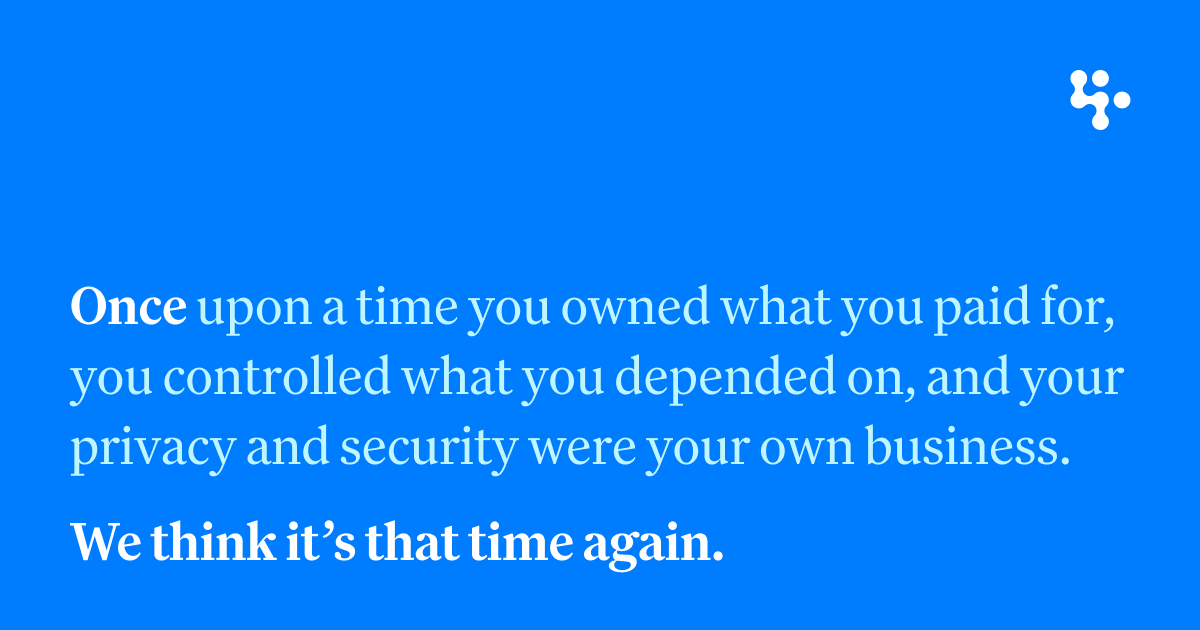…What are they actually launching though? I mean I love the payment scheme but I can’t get excited over this without an actual good product being sold.
Pretty sure they’re going to be handling the zombo.com nft sales
Sure, but can I:
- use the software as I like to?
- see how it works and adapt it to better fit my needs?
- lend it to my friend to help him?
- pay someone else to improve this software?
“In the early 2000s, we were among the early pioneers leading the industry into the SaaS revolution. Now, 20 years later, we intend to help lead the way out. The post–SaaS era is just around the corner.”
So, this company helped to get us into this whole subscription thing, and now they’re going to be the white knights to save us from it?
It would have happened anyway.
IT, and other industries have the same seasons like fashion.
Oh, look, it’s the turtleneck season again!
And people forget it’s happened many times before, and act like it’s something new every time.
Kinda miss the semi-futuristic 80s and 90s though. Give me those grey boxes and neon lights again!
I feel like we are not too far from that becoming a trend again
I mean, I get it, but there’s value in paying for support and updates, and it’s untenable for an organization to do that for free. I’m optimistic for software running under this model, I’d 1000% love to go back to the pay once per major version model, but “pay once forever” software leaves some unanswered questions.
First question: the fuck are they actually making? They’re so vague about everything except how to pay.
They’ll tell you after you pay them
Typical DHH bullshit. He likes to be contrarian but he never actually follows through.
He’s a little bitch and both Ruby on Rails and the world endurance championship would be better off without him.
Woah woah woah back the fuck up what about WEC?
DHH is a driver for JOTA in LMP2, he was originally a gentleman driver in pro-am like your typical rich tech guy
Oh, I never paid attention to P2. They’re like the awkward middle child between the two classes I actually cared about.
I mean, this is signed by Jason Fried, but I get your point.
I agree. Per major version. I have SaaS for things such as word that really don’t change much.
I think there were probably times where software that got shipped actually worked. So you bought it and you could use it, no need for “maintenance”. I generally don’t think that’s the right word since software doesn’t decay on its own, so there’s nothing to “maintain” actively. Apart from compatibility of course, but if that breaks (e.g. with newer OS or hardware), it would make sense to pay for an update if you need it. Makes a lot more sense than those disgusting subscription scams that adobe is pulling off (and every other company seems to follow).
There were still bugs. You just learned how to deal with them or work around them.
What is the point of this and why is this being posted?
37Signals, the company that made Basecamp, is really good at getting news. They’re a really small company (less than 30 ppl), but the owners are all big in marketing. So they write books about culture and how to run a business, as well as how to get attention.
This post is again, them finding a way to get attention.
I neither like or dislike 37Signals. I think theyre neat. But I also read their books like it’s fantasy, as they are telling the business world how to run their companies while also being such a tiny entity.
Can someone enlighten me as to when this magical period of time was supposed to have been? As far as I can remember (end of the 80s), proprietary software never had any source available and always had an EULA stating that you don’t actually own anything. Best you could get was usage rights which were revocable for arbitrary reasons. So I’m a bit confused as to what they are talking about.
Right. Even pay-once software can have a phone home component that disables it if the creator deems it. So really we’re talking about old versions of software that just used offline license keys which were easily cracked.
I honestly really like the Jetbrains model where they offer a subscription for continual updates but you also get a fallback version you can use forever if you decide to stop paying. It acknowledges that you aren’t costing them money if you aren’t getting the new updates.
I came across a similar pricing model for Prodigy, and it does seem like a sensible option. You pay for updates, but will always be able to use the versions you already have in perpetuity.
Ya’ll remember Windows, right? I know Microsoft catches all the shade when it comes to FOSS, but you know, it had this same model: 3.1, 95, 98, SE, 2001, XP, 8, 10… And to this day that is why you have industrial machinery run on windows 98. Buy it once. It’s yours.
Unfortunately it doesn’t work like that anymore. Products have to work in an ecosystem now. When MS got slammed with anti-trust cases, it forced the ecosystem out into the open, for better or worse, and there is no putting that genie back in the bottle. Sure, pay for it once, own it. But that kind of payment model doesn’t congeal with our way of life anymore. Five years from now, are you gonna be able to use whatever the fuck this company is selling with whatever is just released on the market? Not if you haven’t paid the company to provide 5 years worth of updates.
So, yeah, celebrate your nostalgic payment system and throw your money away on a product that will be obsolete before it pays for itself.
It’s not like you own your Windows copy though - you are not allowed to do anything with it you want.
You have to use free - as in freedom - software, like provided by gnu.orgIn fact, you agree by accepting the EULA that you do not, in fact, own anything and that Microsoft can revoke the right to use their software at any time.
Arr… owning stuff is the good thing.
FOSS > ONCE > SaaS
ONCE is a comprimize but it is not an ideal. I would rather have true freedom to use software as I wish.
well sure, as a user FOSS is ideal, but as a developer it’s not ideal you’re not getting paid for your software…
Just paying a developer once for software you use seems like a decent compromise
You know… after the fiasco that literally forced them to rename the company, I’m good







